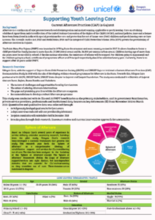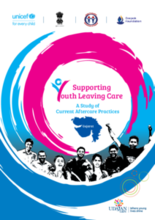“Current Aftercare Practices” (CAP) is a documentation exercise conducted in the State of Gujarat and is part of a multi-state documentation conducted in Karnataka, Rajasthan, Gujarat, and Delhi. Udayan Care has undertaken the CAP documentation in partnership with Gujarat State Child Protection Society and is supported and funded by UNICEF Gujarat. Implemented by Deepak Foundation, it is based on the premise that every child who leaves an Alternative Care setting on completing 18 years of age (or becomes a ‘Care Leaver’, ‘CL’ hereafter) needs extended support in the form of Aftercare. The CAP documentation gathers evidence through a scientific data collection process, consolidates knowledge and promising practices, and discusses gaps and challenges from multi-stakeholders’ perspective. At various stages, the documentation has employed participatory methods to incorporate the voices of CLs and critical feedback from key stakeholders and experts.
Based on Udayan Care’s experience in child protection, extensive literature review and from the findings of the pilot study conducted in Delhi in 2017, the Sphere of Aftercare has been developed as a conceptual and analytical framework for this report. This ‘Sphere of Aftercare’ comprehensively identifies 8 different domains of Aftercare, which are affordable and adequate housing, independent living skills, interpersonal skills and social relationships, mental and emotional wellbeing, physical health, financial independence and career, education and vocational skills, and identity and legal awareness. The CAP documentation is designed to look at the support and services received by CLs from the objective lens of an ‘Aftercare Quality Index’ (AQI), calculated using the scores within each of these 8 domains.
The report covers a total of 104 CLs from Gujarat, comprising of 63 males and 41 females, from both Government and NGO-run Child Care Institutions (CCIs). The present documentation also includes children who avail the benefits under the Palak Mata Pita Yojna (PMPY) scheme of the Gujarat Government. Out of 104 CLs, 20 children are PMPY beneficiaries who do not come under the purview of the Juvenile Justice (Care and Protection of Children) Act, 2015 (JJ Act). Currently, Aftercare provision is meant only for CLs exiting from CCIs and is not applicable for PMPY beneficiaries in the state. Although much is happening on Aftercare in the State, there are many areas where we as duty-bearers need to rise to the call to meet the aspirations of the CLs.


